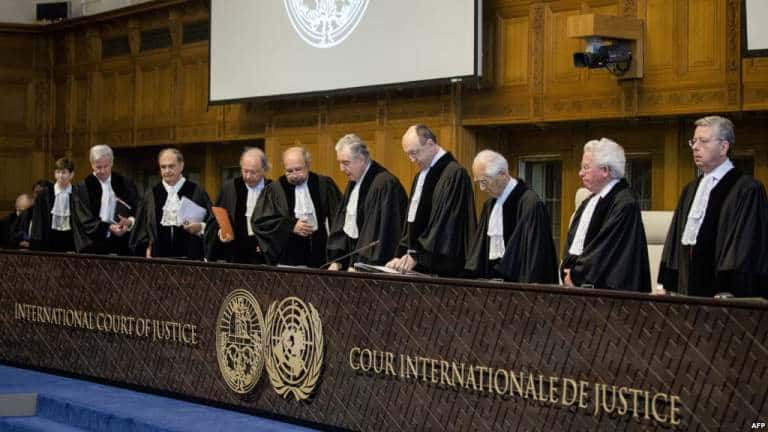The International Court of Justice (ICJ) has reserved its judgement on India’s appeal for a provisional stay on the execution of one of its citizens Kulbhushan Jadhav, who was convicted of espionage and sentenced to death by Pakistan.
The move came after Pakistan’s lawyer Khawar Quraishi presented his arguments on Monday. Among other things, Quraishi argued over the jurisdiction of the court to hear a case of this nature.
Mohammad Faisal, from the Pakistani foreign affairs ministry, said the tribunal had been shown a video of the confession which was available online “for viewers to decide for themselves whether commander Jadhav is confessing voluntarily”.
Here is the full video of arguments presented by Pakistan at The Hague:
Vienna Convention does not apply to spies
Responding to India’s arguments that Pakistan military court awarding death sentence to Kulbhushan Jadhav is a violation of the Vienna Convention on Consular Relations, Pakistan’s representative Khawar Qureshi said India’s plea for invoking provisions of Article 36 of the Vienna Convention is not relevant in this case. The Vienna Convention was adopted for better communication between friendly countries. But it cannot apply in this case of a spy set up by a state.
Qureshi argued, “The ICJ is not a criminal court and cannot decide such type of cases relating to national security.”
He further appealed to the court to dismiss the Indian application, saying that “there is no urgency”.
“I will invite this court to dismiss this application, says Qureshi, listing out reasons for the claim. There is no urgency and the jurisdiction in this case is limited and unqualified.”
Qureshi also said that the provisions of the Vienna Convention do not apply to a “spy involved in terror activities”. He said that Jadhav “is a terrorist” and “India invoked the jurisdiction of this court improperly.”

“This court exists to ensure that states engage in peaceful resolution of disputes. This court does not exist for time-wasting and political grandstanding,” he maintained.
“India’s allegation regarding the kidnapping of its spy is not true and he [Jadhav] was arrested by Pakistani forces from Balochistan,” he maintained.
Trial process
Qureshi argued that India’s application at ICJ unnecessary and misconceived while India maintained that Jadhav’s trial process is “farcical”.
Consular access
Refuting India’s allegations that Pakistan rejected 16 requests for consular access to Jadhav, Qureshi argued that Pakistan gave India all the information regarding Jadhav’s investigation, but didn’t receive any response from New Delhi. Jadhav was given 150 days to present a clarification. Spies can’t get consular access.

Pakistan told the court that Jadhav has confessed to having been sent by India to wage terror on the innocent civilians and infrastructure of Pakistan.
Mohammad Faisal, from the Pakistani foreign affairs ministry, said the tribunal had been shown a video of the confession which was available online “for viewers to decide for themselves whether commander Jadhav is confessing voluntarily”.
Evidence
Qureshi said that solid evidences had been provided regarding alleged spy Kulbhushan Jadhav’s ‘activities’. India failed to provide any evidence to counter Pakistan’s claim.
India held that there was no evidence of Jadhav being spy. He was a former naval officer, who had no connection with the government. They further alleged that Chargesheet on Kulbhushan Jadhav was not given to India by Pakistan.
Jadhav’s arrest
Qureshi argued that Jadhav was arrested from Balochistan province denying India’s claims that he was kidnapped from Iran where he was involved in business activities after retiring from the Indian Navy.













